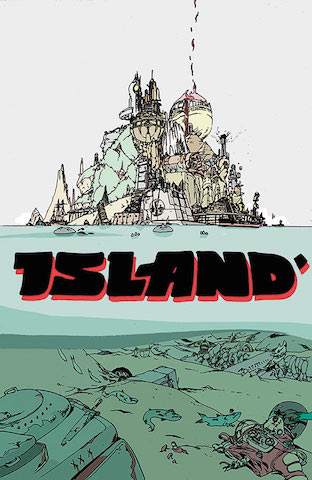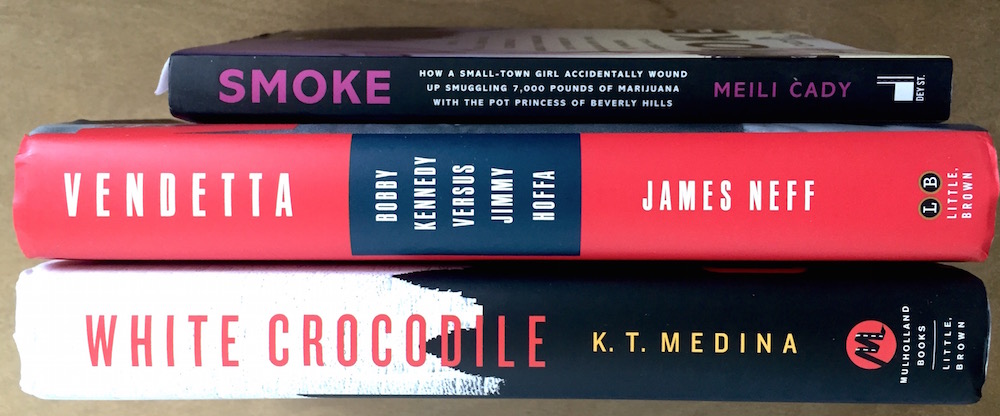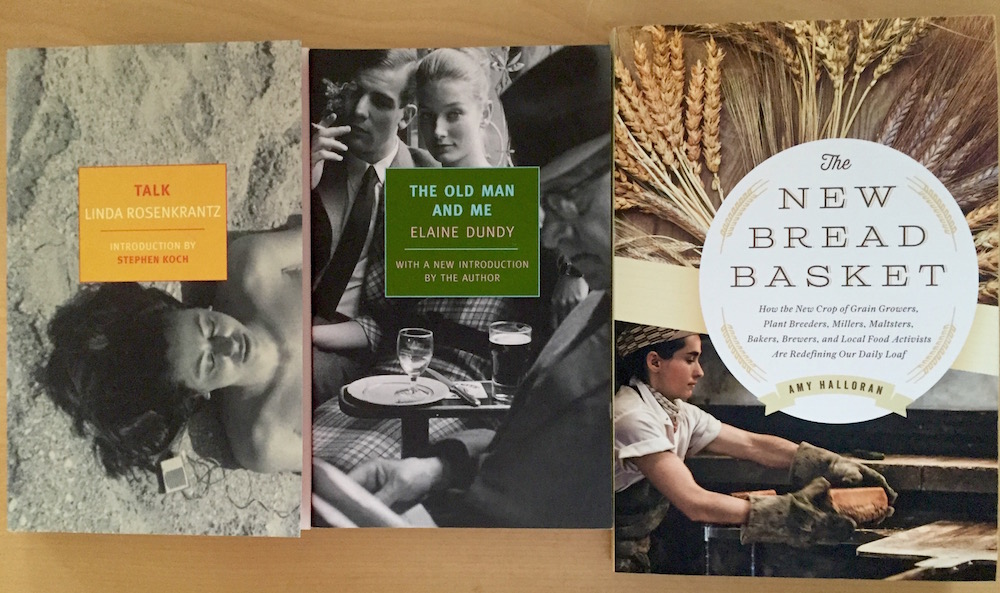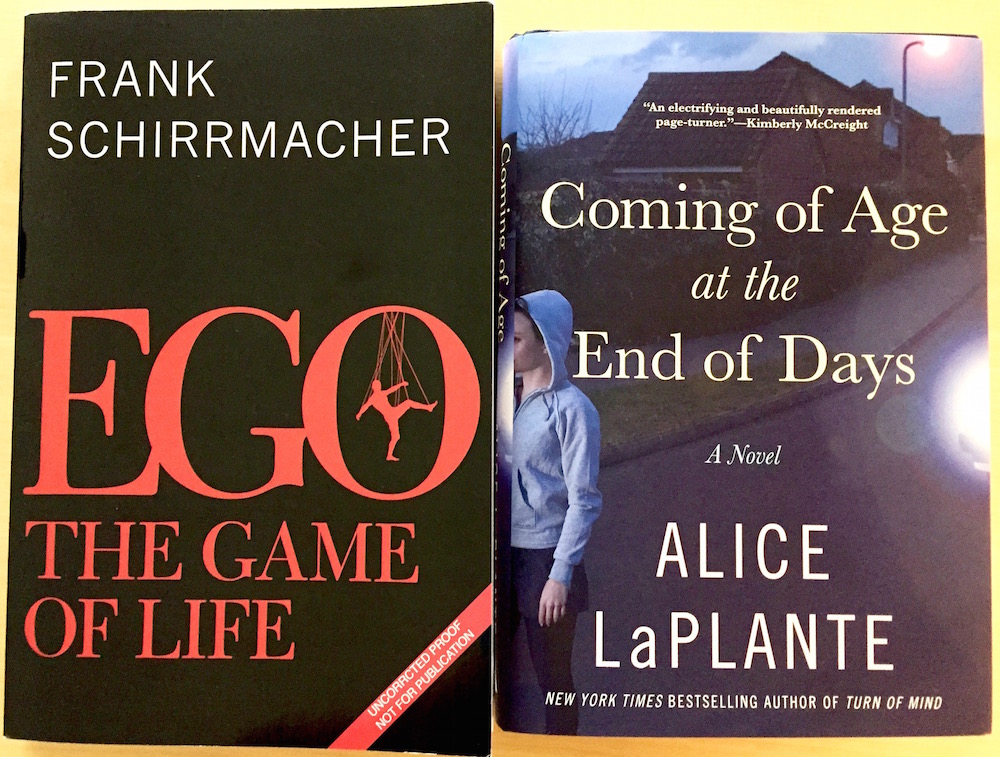Back in 2008, Screenwriter Todd Alcott looked at a rather unique publishing oddity from the 1970s — a book-length marriage proposal to consumer advocate Ralph Nader. These days, we'd call it stalking, but in those days the author Amy Devereaux, after her many letters went ignored, published her 165-page proposal (literally titled Ralph Nader Will You Marry Me?) in a form that can only be called "epistolary plus". It contained letters, songs, stories, poems, and a musical play titled Passionate Purple to Ralph Nader, a musical play.
She's certainly not the first author whose book was filled with delusional thinking. Hers just happens to be a time-capsule of dated akward cringiness.
You, specifically, should be a feminist
Published July 20, 2015, at 11:06am
Finding inspiration and comfort in Adichie's clear vision of why feminism is needed in our world.
Individual tickets for Seattle Arts and Lectures' 2015 and 2016 reading series are now available on their website. This is the best SAL season in years, featuring authors like Ta-Nehisi Coates, Emily St. John Mandel, Teju Cole, and Claudia Rankine. If you can't afford a full series pass, now is the time to stock up on tickets for the lectures you simply can't miss. The Coates and Cole readings, in particular, will likely sell out soon.
Your week in readings: The best literary events for the week of July 20-26, 2015
Monday: The monthly science discussion series Nerd Nite Seattle hosts a lecture titled “Slimers and Submersibles” tonight at LUCIDLounge. Hilary Hayford discusses using radio to track small marine animals and Tim Dwyer discusses using remote-controlled giant robots to investigate the ocean. But there’s also a special guest appearance at this Nerd Nite: a special bonus "live Q&A with real-life researchers currently at sea on a research mission!” Why would you go anywhere else tonight?

Wednesday: Author John Colasacco has a new book called Antigolf coming out from a publisher with the delightful name of Civil Coping Mechanisms. Tonight, he’s celebrating at Vermillion Art Gallery and Bar with delightful local poet Sarah Galvin and APRIL Festival cofounder Willie Fitzgerald, as well as with a Portland author named James Gendron, who is the author of a book titled Sexual Boat.
Thursday: Let’s be clear that Book Lust Nancy Pearl is a local treasure. I’m not as enamored with Steve Scher, who can be a very bad interviewer. But Scher and Pearl together have an easy rapport, especially when they nerd out on books. Town Hall is hosting a live taping of Pearl and Scher’s podcast, “That Stack of Books,” with a pair of special guests tonight at 7:30. It’s $5.
Friday: Geffrey Davis is a poet who was born here (hooray!) and then moved to Pennsylvania (let’s not hold that against him). He’s a Cave Canem fellow, which is a sign of quality in a poet. (You should learn what Cave Canem is, if you’re unfamliar.) He’ll be reading from his new collection, Revising the Storm, at University Book Store tonight at 7 pm.
Saturday: James B. Moore reads from his poetry collection Spirit Unchained: The Autobiography of a Soul: Collected Poems 1967-2014 at Ravenna Third Place Books at 7 pm. That’s maybe one too many colons for a title to bear, but how often do you get to hear a poet reflect on four whole decades in the business?
Sunday: No events that I could find. Go sit in the sun and re-read a book that you were so-so on the first time. Maybe you’ll find something new to love.
Seattle and Seattle and Seattle
Published July 17, 2015, at 8:03pm
In the 1980's Jack Lynch wrote a series of travelogue-by-detective-novels. His book Seattle is full of poetry, cliche, and an overhwelming feeling that the ideal Seattle is always hiding in the recent past.
Gawker proves the importance of editors in the most backward way possible
For the last twelve hours or so, the internet has been railing against Gawker for publishing a post that allegedly outed a non-public figure, a man married to a woman, for trying to hire a male escort. This is, of course, a dumb and wrong post for Gawker to publish. Full stop. There's no hypocrisy to unveil, no Republican moral double-back-flips to disprove in this story. Some guy has a social life that other people might describe as screwed-up. Who cares? Where's the story?
Gawker publisher Nick Denton just wrote a dumb post explaining he is taking the controversial post down because stories "have to reveal something meaningful. They have to be true and interesting. These texts were interesting, but not enough, in my view." This is not what you want a publisher to say. You want a publisher to withdraw a post because it's morally wrong, not because it's not interesting enough. Denton's post doesn't indicate that he's learned any kind of lesson from this.
The best commentary on this whole sad affair was written by former Gawker writer Adam Weinstein at his blog. Weinstein (who, to be fair, was recently fired from Gawker and so is maybe not the most impartial human being) explains what his experience at Gawker was like and he identifies what he believes to be the problem with this whole story:
A quick caveat: This is an editing problem, not a writing problem. The story author, Jordan Sargent, is young and smart and talented and energetic, as are virtually all of the content producers I meet today – at Gawker, at the New York Times, at even the handful of sites I have major issues with. We all need editors to push us to report better, to write better, to exercise better judgment. As former Gawkerer Richard Lawson explained here and here last night, our bloggy world doesn’t incentivize that kind of editorial oversight. But that oversight is what makes the difference between good writers and writers who are also good but make very bad calls, and have to live with those calls, and also have to live with your smarmy abusive online threats. (Stop the abuse. Don’t answer childishness with more childishness.)
You really should read the whole post, but you should also bear in mind that every reporter who leaves a paper believes that the time they worked at the paper was the end of a golden age. I'm sure dozens of other former Gawker writers (and hundreds of former Gakwer readers) would identify the site's golden age as 2008, or 2007, or 2004, or 2014. From the moment of inception, every publication is dying in the mind of some reader or contributor or another (The Seattle Review of Books was so cool when it started two weeks ago, but it really went downhill when that idiot Paul Constant published that dumb review of the Ayn Rand biography.) This argument doesn't interest me as much as the question of editing.
The thing about good editing is it's invisible. There's less and less editing these days as publications in the business of — ugh — producing "content" need to make merciless cuts in order to preserve the bottom line. But when editors disappear, or when editors are overworked to the point where they can't do their jobs effectively anymore, incidents like this Gawker story start happening. Books are published every day that a few decades ago would have been considered not ready for publication. (Read To Kill a Mockingbird and then read Go Set a Watchman and you'll likely learn a vital lesson about the importance of editing. Same with Hemingway's posthumously published works.)
Because it's hard to make a case for editors, editing is dying. Media outlets atrophy and die when editors disappear. Books fumble their perceived cultural importance when editors are stripped of their role in the publication process. More and more every day, you can find proof of why good editors are so necessary to good writing. That proof, sadly, is only visible when editors are absent.
Marvel Comics recently announced they were publishing hip-hop themed covers on all their books in October. This launched a conversation about the fact that Marvel doesn't hire people of color to write their books, which kind of makes this whole hip-hop cover thing smack of appropriation.
Comics critic David Brothers wrote an excellent long Tumblr post about why people of color are unhappy about this cover tribute, and you should read the whole thing. But here's a taste:
Storm is the highest profile black character in comics. Which is great! But…she’s mostly been written by white men, and a very small fraternity of black men, throughout the decades. Imagine what a black woman could bring to the character. Shouldn’t a black lady get a chance at bat? I grew up on Alison Sealy-Smith, and I’ve got a soft spot for Halle, but there’s a gap there... you can’t celebrate and profit off something without also including the group that you’re profiting off the back of. Marvel has made a lot of money off brown faces. A portion of X-Men’s juice is from the struggle for civil rights, and we all know what the phrase "black Spider-Man" has done for the perception of your company. (He’s Puerto Rican too, tho.) So to see Marvel continue to profit off something very dear to black people without actually giving black people a seat at the table…I was going to say it “stings,” but in actuality it sucks. It makes Marvel look clueless and it makes black people wonder why they bother with your comics.
A good rule of thumb for this kind of thing is that if you're treating race like a costume, you're wrong and you should apologize and stop what you're doing. I think that's what Marvel is doing here. Now go read the rest of what Brothers has to say.
For a while there in 2009, reporting on books and publishing basically involved firing up the old internet-box on a daily basis and looking around to see which magazines were going out of business. Thankfully that crisis has passed, but we still lose good magazines every now and again. National Journal's print publication is going under at the end of this year; the publisher says "News in DC now moves too quickly for a weekly publication." Layoffs may follow. The publication will still live online, though the transition to online-only is not always an easy one. National Journal always presented a smarter, less tabloid-y version of Politico's DC insider-rag schtick. It was not always the best magazine on politics, but you could at least always tell the staff cared about their topics, and about the importance of good writing.
Thursday Comics Hangover: The possibility of an Island
(Every comics fan knows that Wednesday is new comics day, the glorious time of the week when brand-new comics arrive at shops around the country. Thursday Comics Hangover is a weekly column reviewing some of the new books that I pick up at Phoenix Comics, my friendly neighborhood comic book store.)

Serialized anthology comics are tough. They’re a pain to coordinate, for starters, and it’s hard to find an audience for a series of short, ongoing stories by a wide array of artists. I want to support anthology comics — Monkeysuit, a lively anthology back at the turn of the century was a particular favorite — but I have to admit that I often can’t be bothered when a new anthology starts up. Too much of an investment, too little return. For the most part, they disappear before they even really get started.
So I wasn’t planning to pick up the first issue of Island, the new anthology edited by Brandon Graham, but, hell, you try to ignore it. It’s a massive book for a monthly comic — over a hundred pages, squarebound, drawing in your eye the way light gets sucked into a black hole. The cover kneecapped me, with its intricate drawing of an island made up of many parts (a forest, a sci-fi spaceport tower, a temple, a sailing vessel straight out of Moby Dick moored to one side) and its moody blue-gray color palette. Nothing else on the stands looks like this. I had to have a copy because it was a beautiful object and sometimes it feels good to own a beautiful object. And even at $7.99, a dense, full-color comics anthology feels positively European, the kind of artistic endeavor you should want to support.
Like all anthologies, some of the stories in Island hit me harder than others. My favorite story was the one that opens the collection, “I.D.” by Emma Rios. A support group meets in a coffee shop. Rios tells her story in tightly cropped panels, claustrophic and tinted only in shades of red. Gradually, we see that the story is set in the future — people start discussing an interplanetary mining colony operation — and we learn that the support group is for people seeking body transplants. “My metabolism doesn’t allow me to be the man I want to be,” one character says, adding “I can’t stand being this weak anymore.” Just as the story starts picking up, something happens and then it’s To Be Continued time. It’s an excellent first chapter to a longer story, ending not on a shameless cliffhanger but at a point of change for the characters.
Comics author Kelly Sue DeConnick contributes a four-page prose essay about a friend who helped her become an author. “I was newly sober, which is a lot like walking around with no skin on,” DeConnick writes. The account is honest and raw and as earnest as DeConnick undoubtedly was, back in the days when she walked around everywhere carrying “a notebook and How to Write a Novel in 90 Days, the cover purposefully displayed."
Graham’s contribution is beautiful — just in terms of pure density, nobody draws a more rewarding comics page than Graham, with characters slouching around cityscapes packed with details and wordplay and corny jokes (on one street, a home is marked “Tori’s House,” with a tower down the street labeled as an “Observe a Tori.”) I’m not sure what, exactly, is going on in the story beyond a couple going to a restaurant that only serves whale, but I want to examine these pages, with their diagrams of cups of pudding and digressions about pornographic currency (“barely legal tender,” of course,) until a story makes itself obvious. With Graham’s work, the digging is the treasure.
The final story, a skateboarding (kinda) superhero adventure by an artist named Ludroe, is rougher than all the others — you get the sense that Ludroe is a graffiti artist who hasn’t quite adapted from Sharpies to a more nuanced tool — but it feels like an attempt to create an urban mythology. Maybe if someone tried to invent Marvel Comics in the New York City of today, it would look something like this.
So, yes. There’s no real connective tissue between these stories besides the fact that they appear between the same covers, and Brandon Graham decided to show them to you. Sure, the stories share some artistic flourishes — a European sensibility, a progressive vibrance — but they’re distinct works by distinct artists. Maybe that’s why Island works so well. It doesn’t try too hard to sell an aesthetic beyond pure cartooning ambition. In this case, that’s more than enough of a unifying theme to win my allegiance.
Cartoonist Matt Bors just announced that his online cartooning hub The Nib has parted ways with blogging site Medium. Of the split with Medium, Bors simply says "our ambitions diverged," and he promises that "I don’t think it will be long until I have something to announce" in terms of The Nib finding a new home. Let's hope not; The Nib has been publishing some great comics on a regular basis and in its short year and a half of existence, it became a destination for those in search of good comics on the web. This is something the internet desperately needs.
Today, in case you can't tell from the flurry of posts on the internet and on this site, is the official release day of the To Kill a Mockingbird sequel/prequel. If you're frustrated by the overkill, I promise it will all be over tomorrow. But until then, Quartz has discovered that significant portions of Watchman very closely resemble significant portions of Mockingbird. Of course, self-plagiarism is no crime — and by all accounts, Watchman was an early draft of Mockingbird, which explains the overlap — but it again raises the question of why Watchman even exists.
If a large chunk of the book has already been cannibalized to create another (most likely better) novel, why should anyone bother to read the cannibalized version? It's like putting all the stone chips left over from the sculpting of Michaelangelo's David on a pedestal and calling it Not David. The art isn't in the scraps used to make the art. The art is what's left after you do all the cutting and shaping and merging. Art is the product of intent, not the happenstance of creation.
OMG, this headline: "Harper Lee Announces Third Novel, ‘My Excellent Caretaker Deserves My Entire Fortune.’" So cruel, so funny.
Tolstoy's unhappy family moves to the Northwest
Published July 13, 2015, at 11:44pm
Raw, naked, and unadorned in its language, Kruse's Call Me Home takes us inside a violent family from multiple points of view.
In letters to the Justice Department, authors and booksellers allege that "Amazon has used its dominance in ways that we believe harm the interests of America’s readers, impoverish the book industry as a whole, damage the careers of (and generate fear among) many authors, and impede the free flow of ideas in our society.”
Republican presidential candidate/human idea toilet Ted Cruz just published a new memoir to promote his presidential campaign. The New York Times refused to put the book on its bestseller list, saying its sales numbers were inflated due to "strategic bulk purchases." Now Amazon and the book's publisher, Harper Collins, are both defending Cruz, saying they see no sign of bulk purchases.
I mean, the dirty secret of all bestselling political books is that they're manipulated by bulk purchases. Getting "New York Times Bestseller" on the front of your book is a cheap way to earn credibility and popularity. All sorts of authors and pubishers do this.
If you want a look inside how this kind of thing happens, you should read about the scandal that erupted when it was revealed that former Mars Hill preacher/human hairgel farm Mark Driscoll's book Real Marriage only landed on the bestseller list due to bulk purchase manipulation. Blogger Warren Throckmorton published a copy of the contract Mars Hill signed to land the book on the list, and it's full of little tricks: the agency in question uses "over a thousand different payment types” to buy multiple copies of the book and “requires a minimum of 90 geographically disperse (sic) addresses” to ship those copies to, in order to make it seem like the book was a spontaneous success. I have no doubt that agencies like the one Driscoll hired are still in operation and still gaming the system. This gig is too lucrative for them to give up. Is Cruz's campaign using one of these firms? I have no way of saying for sure — I certainly have no proof — but it's pretty damn likely.
While everyone in Seattle is currently freaking out about Kathryn Schulz's excellent New Yorker article detailing how we we're overdue for an impossibly bad earthquake, I'd like to take this opportunity to remind you to read Sandi Doughton's excellent Full-Rip 9.0: The Next Big Earthquake in the Pacific Northwest. Doughton gets into detail that the New Yorker simply doesn't have room for, explaining all the various fault lines and different kinds of earthquakes that could strike Seattle in specific and the Pacific Northwest in general. It's an excellent book that will leave Seattleites stricken with insomnia for days.
Your week in readings: The best literary events from July 13-19, 2015
MONDAY: Elliott Bay Book Company hosts Seattle Times reporter James Neff, who debuts his new historical account, Vendetta: Bobby Kennedy Versus Jimmy Hoffa. This one’s got some good blurbs. Seymour Hersh says, “This is not a book about a good Bobby versus a bad Hoffa. It is a study of two men who always got what they wanted staging a shootout on the streets of Laredo. And, as Neff tells it, there were no winners.” And Erik Larson — Devil in the White City Erik Larson — calls it “a triumph of investigation and revelation.” That makes it well worth your time.
TUESDAY: Might as well have a pajama party in Elliott Bay Book Company all night Monday night, because they’ve got the best reading of Tuesday, too. Lidia Yukanvitch, the brilliant Portland author of Dora: A Headcase, reads from her new novel, The Small Backs of Children.
WEDNESDAY: Ada’s Technical Books hosts a comic book reading with Anders Nilsen and Marc Bell. Bell presents his first “full-length graphic novella,” which seems like a weird designation — what is the fullest length a graphic novella can reach without hitting novel-size? For that matter, what’s the official size of a graphic novel? Anyway, in Stroppy, the protagonist “hopes to win big in a songwriting contest organized by the All-Star Schnauzer Band.” Nilsen, who has made some great comics including the terrific Charles Schulz-meets-Tolstoy bird epic Big Questions, celebrates the publication of a new collection of his sketchbooks. It’s titled Poetry Is Useless, which is a great title.
THURSDAY: Up at Ravenna Third Place, Jody Bower reads from her book Jane Eyre's Sisters, which “argues that Joseph Campbell's model of the hero's journey does not work for women.” Instead, Bower thinks books about female heroes “need a different model to do justice to a woman's experience of moving beyond the expectations of conventional societal roles to find her true, creative self.” This is a fascinating argument.
FRIDAY: Back to Elliott Bay Book Company for a reading from Scott Dodson, who’ll read from his book The Legacy of Ruth Bader Ginsburg. Dodson’s book couldn’t be any better timed, now that the Notorious RGB has become a style icon.
SATURDAY: No events today. You should probably set the day aside to either read Go Set a Watchman, which was released on Tuesday or — my preference — re-read To Kill a Mockingbird, instead.
SUNDAY: No readings today, either. It’s summer! Go read a book in the park. Recommend a book to a friend, and ask for a recommendation in return. Bury your face in the pages of a book and waggle your face around for a while.


